7 Books On Veterans Who Bring War Home
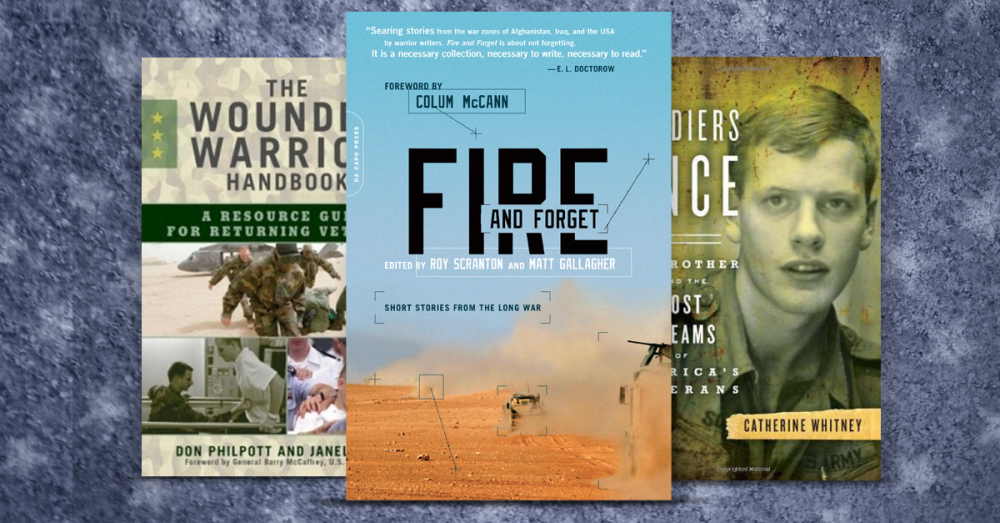
Veterans Day is all about honoring those who have served our country. It’s also about recognizing their struggles, knowing that sometimes, they bring the war home with them. These books are the stories of veterans, their memoirs, and biographies. They discuss what it’s like to live with their memories. Some are self-help books to help veterans cope with life outside of war. Powerful and touching, these stories delve into soldiers’ past and help us learn why we honor them today.
Soldiers Once
My Brother and the Lost Dreams of Americas Veterans
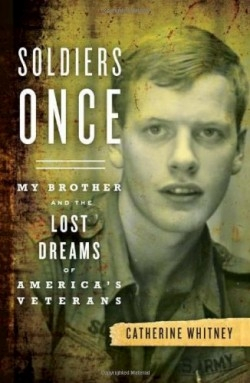
Catherine Whitney
Da Capo Press
Unknown $25.00 (240pp)
978-0-306-81788-5
Buy: Amazon
“The great myth of war is that it can be left behind,” Catherine Whitney observes in this stirring, yet sadly familiar story about her brother, Jim Schuler. Retired Staff Sergeant Schuler lived through three years in Vietnam, but he couldn’t survive his longest tour-the return to civilian life. He died the day before 9/11 at age fifty-three, or, as the author tells us, three years younger than the average life expectancy of a Vietnam veteran.
In Soldiers Once: My Brother and the Lost Dreams of Americas Veterans (Da Capo Press, 978-0-306-81788-5), Whitney, who has co-authored and ghost-written more than thirty books, reveals how her brothers life had begun to unravel during his three tours in engineering battalions, where he blew up more things than he helped build. By 1971, the author, now involved in the peace movement, and her brother parted over the meaning of the war. The book describes how Whitney put together the missing pieces of Schuler’s tragic life, which entered a downward spiral of Post-Traumatic Stress Disorder and alcoholism. Whitney writes with a simple eloquence that compares with Ron Kovics iconic Born on the Fourth of July. In addition to the story of her brother, Whitney indicts recent presidencies for cutting budgets while promising improved veterans services. The author rightly identifies this as a national disgrace. She vividly shows how her brother was a victim, along with thousands of other vets who have died or who are living lives of slow death.
KARL HELICHER (June 12, 2009)
Flexible Wings

Veda Stamps
IMO Books
Hardcover $25.99 (296pp)
978-0-9960357-0-5
Buy: Amazon
Flexible Wings is a powerful story with a uniquely contemporary military brat heroine and timeless themes of love, family, friendship, and self-acceptance.
Japan, Italy, Florida, Texas, Virginia, and South Carolina have all been home to Summer Stevenson, but the challenge of following her active duty military parents around the world doesn’t seem to be getting any easier. In Flexible Wings, Veda Stamps addresses some the most common yet unexplored concerns facing the families of America’s servicemen and women today.
Moving to Valencia, California and leaving behind her best friend, Esperanza, was not eleven year old Summer Stevenson’s idea. In fact, everything about this latest relocation has Summer tied in knots. Her father is busy pursuing a steady stateside career, her mother deploys to an unknown location, and the neighborhood girls all seem to be bullies. Then Summer joins the community swim team, her beloved Baachan (grandma) moves in to help out, and Summer starts to see herself and her life in a whole new light.
A delightfully honest fusion of courage, strength, and insecurity, Summer accepts her mixed heritage with pride and practicality, “Dad is Japanese and African American, and Mom is African American and a bunch of other stuff. … I’ll just tell people that I’m African American to keep things simple.” Olympic medalist and competitive swimmer, Lia Neal, also a blend of African American and Asian, keeps Summer motivated as she tastes failure and success at swim meets, handles poolside bullies and crushes, and attempts to subdue her full head of braids into impossibly small swim caps.
The author manages to incorporate numerous sensitive topics as seen from Summer’s point of view and through the filter of her eleven-year-old experience which allows open discussions about PTSD, deployment, IEDs, and even death in the line of duty to occur without overwhelming or confusing. Summer has nightmares about her parents’ combat experiences, and both her mother and father struggle to reconcile the careers they’ve chosen with the continued well being of their family.
Although Stamps’s research into military life gives Flexible Wings a large dose of believability, certain phrases may stand out to anyone more familiar with the jargon and tradition of the armed forces. For example, Summer’s mother and father, who both “chose to join the Navy,” would be unlikely to refer to themselves or their children as “soldier,” a term reserved for members of the Army only. Ditto for Summer’s swim coach Julie whose father was a marine (a US Marine is always a marine, members of the US Navy are sailors). Summer’s mother, a helicopter pilot, mentions being promoted to a “commanding officer,” a position that would make “reenlist” an incorrect word choice. Even so, it’s likely that younger children, with vaguer notions of what their parents actually do, as well as those not accustomed to military lingo would not notice the oversights, particularly since the rest of Summer’s tale rings true.
Flexible Wings is a powerful story, with a uniquely contemporary heroine and timeless themes of love, family, friendship, and self-acceptance. It’s an excellent choice for upper elementary, middle school, or classrooms and libraries looking for positive, multicultural, realistic fiction. Military and civilian families alike would benefit from seeing the world through Summer’s eyes.
PALLAS GATES MCCORQUODALE (June 18, 2015)
Then I Came Home
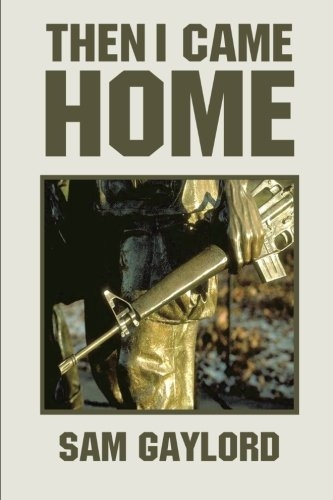
Sam Gaylord
AuthorHouse
Softcover $12.50 (160pp)
978-1-4033-2734-5
Buy: Amazon
A Vietnam veteran tells the hard story of how he turned fear into gratitude and anger into the motivation to help himself and others.
Sam Gaylord’s memoir, Then I Came Home, is a story of hard luck and redemption. Gaylord reflects on a childhood of poverty and abuse, followed by a horrific Vietnam War experience that left him disabled. He also says the US government did not stand behind its troops in that war and has not been listening to its combat veterans. This book is authentic and engaging.
Gaylord tells of growing up one of nine kids in a dirt-poor Irish/Indian family. His father, an itinerant farm laborer, moved them from one leaky-roofed shack to the next in rural southern Indiana along the Ohio River. He was “the most different kid in class,” in ragged clothes and botched haircuts administered by his mother. Not long after high school, he joined the Marines, where he saw an opportunity to serve his country and, later, use his veteran’s benefits to further his education. He arrived in Vietnam in time for the legendary battle of Hue, where he became “part of the insanity.” And Hue was only the beginning of his tour.
It was 0800 hours and we were told to saddle up. … I had my M-16 rifle, my helmet, flak jacket, plenty of ammo, hand grenades, 2 canteens of water, C-rations (food), new combat boots, bug spray and flares. I felt like John (fucking) Wayne.
The book’s cover, page layout, and bold type are as simple and direct as Gaylord’s writing style. Not one to strike a false note with a literary turn of phrase, he writes in a clear, plainspoken style, and his voice rings true. Grammar and punctuation are not always correct, nor is spelling, but these things rarely distract from Sam’s story or his message. His tone is often angry, and he spares almost no one, especially not the honchos in Washington who had “no clue” as to what American boys were experiencing in the “shit hole” in Southeast Asia. Perhaps contradictorily, he also rails at the “draft dodging chicken shits,” many of whom avoided the war just as Sam, who comes to realize the futility of this war, often wishes he had done. He reserves most of his compassion for his fellow grunts, especially disabled combat veterans like himself who, he argues, “deserve better.” But Sam doesn’t clearly convey how these vets are being wronged, or what should be done to improve their lives.
Covering his first twenty years, Gaylord is a reliable narrator, providing readers with relevant details. Back home in Indiana after his convalescence, he is an angry young amputee with an uncontrollable appetite for “Mister Beam and his Uncle Bud.” Eventually, he gets to the point where he does not want to live. In perhaps his best prose, Gaylord humbly tells of a spiritual breakthrough and a shift to a new, can-do outlook. “I had learned,” he writes, in a powerful litany of hard-earned lessons, “to use my anger to motivate myself in a positive way.”
Here his audience, many of whom will be veterans, some of them disabled, will benefit from dramatization. Seeds for his transformation can perhaps be planted early, and several defining moments of his “recovery” will satisfy readers as to how Gaylord turned fear into gratitude and anger into the motivation to help himself and others.
JOE TAYLOR (November 13, 2014)
Fire and Forget

Roy Scranton, editor
Matt Gallagher, editor
De Capo Press
Softcover $15.99 (256pp)
978-0-306-82176-9
Buy: Amazon
It’s sometimes hard to understand a hero’s heart. Thousands of soldiers have fought in Iraq and Afghanistan, and when they return, they often find it difficult, even impossible, to explain what they faced and how they feel. They need to speak, for their own sakes, for healing. We need to hear them, to comprehend their sacrifice and to support them.
Fire and Forget can assist us. A short-story collection of fiction written by actual soldiers, it emerged out of a project intended to help veterans process their experiences. It also aims to share with readers what soldiers long to tell but cannot express. And it focuses heavily on their lives after they return home. From an inability to find purpose and direction to feeling alone, angry, or unable to cope, the revelations, while hardly surprising, prove deeply insightful.
There’s one story about a veteran who desperately wants to tell his wife how he feels but cannot find the words. Without them, he can only lash out. But, “Being angry with her in just the right way never seemed to make her understand.” Another tells of a woman who incessantly rides the subway, the only place that helps her forget a painful event she experienced while serving. Attempting to meet her mother for a few quiet days away, she cannot bring herself to go to even that safe place. Others tell of violent impulses or the inability to pull out of a pained state long enough to get a needed job. One account offers the perspective of the wife reunited with a hurting soldier. Only a few speak directly of the wartime experience.
The writing is vivid and compelling, artfully selected by the editors. But it’s heavy. At times, the book is best read in small chunks, as it will strain the emotions. Aside from one story, in which a vet imagines training and commanding wild rabbits to take over a university, little lightens the mood. However, this is an important book. Important for veterans, to know they are not alone. Vital for those who haven’t served, to understand the needs of returning soldiers. And insightful for all, to understand just how great a sacrifice our military members make. Although some may find the reality of what it means to be a hero tough to bear, this collection deserves to be read.
DIANE GARDNER (February 26, 2013)
The Wounded Warrior Handbook
A Resource Guide for Returning Veterans
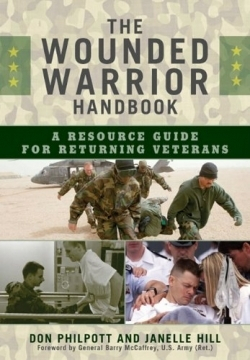
Don Philpott
Janelle Hill
Government Institutes
Unknown (315pp)
978-1-60590-273-9
Buy: Amazon
For the 25000 US service personnel who have been injured since the invasion of Iraq in 2003 a wide ar-ray of medical and other assistance is available. But the biggest obstacle for the wounded and their family members is often a daunting maze of red tape. The Department of Defense (DoD) and the Veterans Administration (VA) have published guides handbooks Web sites and toll-free numbers but these aids often add to the confusion. To address the need for a roadmap Don Philpott and Janelle Hill have assembled the Wounded Warrior Handbook: A Resource Guide for Returning Veterans. Philpott is a veteran journalist and editor of the Homeland Defense Journal; Hill is a consultant and US Marine Corp Volunteer with a degree from National Defense University. With the backing of Government Institutes and Scarecrow Press and cooperation from the DoD and VA Philpott and Hill have assembled a current and comprehensive yet independent resource that may prove to be indispensable to wounded veterans from Iraq and Afghanistan as well as from prior US military campaigns.
This Handbook first addresses the recovery process from the traumatic injury event onward for the active serviceman or woman. It gives practical advice on everything from spotting the symptoms of de-pression to travel instructions for visiting family. It explains the terms of separation from military service and the process for determining and appealing the so-important physical disability status. Much of the Handbook‘s emphasis is on the service member’s transition from medical retirement or separation to rehabilitation continuing care outpatient care job counseling and training and employment. One useful chapter includes a discussion of financial legal and tax issues faced by active and discharged troops. Finally a chapter on bereavement covers everything from grief support to burial expenses military funerals and death benefits.
Contemporary warfare has seen a disproportionate amount of amputations loss of vision and traumatic brain injuries and the military health system and VA are responsive to the special needs of this population. The Handbook reflects the emphasis on care for emotional as well as physical trauma. “Multidisciplinary” medical teams include liaisons—professional social workers—who interface the wounded and their families with treatment and other relevant agencies and re-sources. Readers will discover that despite recent scandals in VA hospitals and the common perception that the US does not support its wounded veterans and their loved ones assistance in every conceivable aspect of transition and reintegration is available. And throughout Philpott and Hill offer names addresses phone numbers and Web addresses.
War and the Soul
Healing Our Nation’s Veterans from Post-Traumatic Stress Disorder
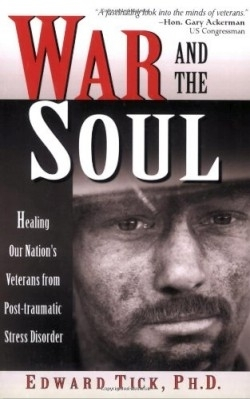
Edward Tick
Quest Books
Softcover $19.95 (329pp)
978-0-8356-0831-2
Buy: Local Bookstore (Bookshop), Amazon
Even Gandhi believed that people need the qualities that warriors once possessed, but soldiering, once a constructive rite of passage, has given up most of the glory it once held. Weapons of mass destruction have ruined war. Machine guns, planes, and nuclear weapons so alter the conduct and effects of war that it degrades much more than it enhances combatants. In this remarkable book, the author, a psychotherapist whose previous books addressed the Vietnam war and dreams in healing, surveys the history and mythology of war in general and its psychological consequences in particular.
His chapter titles include “The Soul in Slaughter,” “Eros and Aesthetics in Hell,” “Relations with the Missing and the Dead,” and “The Healing Power of Storytelling.” A straightforward and eloquent writer, he conveys caring and passion concisely, with the authority of an involved witness. Tick worked as a therapist with veterans for twenty-five years; he views standard approaches to post-traumatic stress disorder (PTSD) skeptically. He became a student of war in historical and cross-cultural perspective. The American Civil War marked the emergence of modern military conflict with the devastating effects of weapons that blasted from a distance. World War I soon eclipsed that, and a generation later, a wider, more devastating conflict ended with atomic weaponry.
“In war,” says the author, “chaos overwhelms compassion, violence replaces cooperation, instinct replaces rationality, gut dominates mind. When drenched in these conditions, the soul is disfigured.” Later, he says of combat, “Horror is married to boredom, fascination to putrescence. … Everything is rendered ultimate, just as it is in myth. The tiniest event can be charged with intensity so overwhelming that it literally reprograms the central nervous system.”
At the tribal and national level, war represents divine will, participation in which requires subordination of individual will coupled with elevation of the warrior to heroic status. War used to be a disciplined rite of passage: in some “primitive” societies, combat ended with the first casualty. War functioned as a kind of extreme sport, a proof of manhood; now it undoes men, families, even nations that have come to depend on it. Inhibitions must die in order to create killers. War becomes a reality show only mimicked in video games, never to be shown on television, where recruitments ads beckon: “Be all you can be.”
The author points out that up through the Civil War, senior officers led their troops into battle. Now the “brass” take their positions safely in the rear. This transforms battle from a mentored rite of passage to something quite different. With destruction at a distance, often indiscriminate (civilians), survival trumps heroism as a goal. Even that survival is weighed down with shame and guilt. The ancient values of maturation, heroism, and sanctity have faded away.
Tick quotes relevant sources from Heraclitus to Chris Hedges (War is a Force that Gives us Meaning, 2003), including psychiatrist Robert Jay Lifton, psychologist James Hillman, war biographies, poets, movies, and his patients. People idealize war, he writes, because they need its awesome mythology, its ready connection to the divine, its simplifying ideology. They cannot weigh its real costs, including PTSD, once known as “soldier’s heart” or “nostalgia.” The old, soulful terms imply a return to normal, to wholeness that was damaged, not just by “shell shock” but by killing—an inversion of moral values. Soldiers dehumanize other people in order to kill them, but later, with survivor guilt, veterans question their very souls as victims inhabit memory rehumanized. Conventional therapy for PTSD, which emphasizes medication and avoids moral and spiritual issues (like “soul”) fall short, even as the incidence of the syndrome rises in the current war in Iraq.
Tick cites the fact that homeless veterans number some 270,000, most from the Vietnam War, and that suicides now outnumber fatal casualties from that war. He reasons that PTSD afflicts not only the individual soul, but that of a nation that once basked in the assurance of its goodness and now finds evidence of evil within. Tick asserts that PTSD is an identity disorder that requires healing of a wounded soul. His method connects suffering with the healing power of myth, including reconciliation with the dead and, ironically, attaining the character values of a true warrior. The last four chapters explain this journey: purification and cleansing, the healing power of storytelling, restitution in the family and the nation, and initiation as a warrior.
When it comes to making war and going to war, this book is required reading for those who would do it with informed consent, or would refrain for good reason.
E. JAMES LIEBERMAN (August 18, 2009)
A Lifetime at War
Life after Being Severely Wounded in Combat; Never Ending Dung
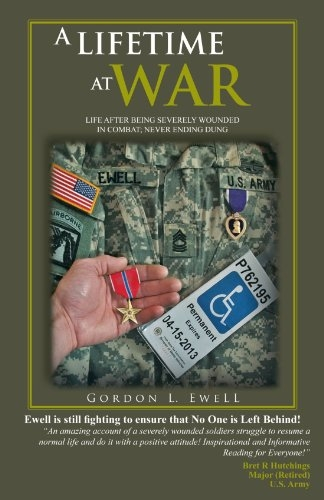
Gordon L. Ewell
Trafford
Softcover $11.59 (198pp)
978-1-4669-3266-1
Buy: Local Bookstore (Bookshop), Amazon
Trying to digest the extent and implications of Gordon L. Ewell’s injuries is nearly impossible. A career soldier, the master sergeant was severely wounded in an IED explosion in Iraq. After fifty-nine missions, it was the sixth such explosion he had experienced, and his list of resulting physical traumas is a full paragraph long.
In an earlier war, Ewell might not have survived to tell his tale. Readers today are fortunate that he did, for as gruesome as his injuries and permanent disabilities may be, he offers hope and compassion to others facing long-term recoveries. A Lifetime at War is not a poor-me tale of complaint, but rather an extremely honest account of a horrendous struggle. Ewell’s story is deeply inspirational and informative, and one that any person concerned with the fate of America’s injured and disabled veterans should read.
Ewell is neither perpetually cheerful nor prone to sugarcoat anything. “It just plain sucks!” he often says. Suffering the residual effects of a traumatic brain injury, he knows that his disabilities are permanent yet he continues to face his issues head-on, often even with a bit of humor. “My brain and my left leg are not always on speaking terms,” he comments, and, “my brain chose, among other things, to divorce my bladder. They no longer communicate.” He credits his military training for his “ability to adapt and overcome in any environment,” and compares the long road to recovery to a war zone, its evolving missions changing at any moment. The soldier in him comes through, and other veterans will relate: “You do what you have to do; you sacrifice and endure.” As Ewell sees it, a disabling injury may end the fighting in one war, but it starts a new war of its own.
Ewell’s writing style is direct, if somewhat repetitive and reliant on cliched language. He speaks of inevitable depression and facing demons, never implying that they can be avoided, and discusses the impact of traumatic injury on loved ones and friends, acknowledging that they will also suffer. He discusses Post Traumatic Stress Disorder, suicidal thoughts, and more, exhibiting a keen familiarity, and offers guidance and information about places to go for help. Ewall deals with his own PTSD by writing poetry and includes a selection of his poems as well. No topic is off limits, and what he has to say is exactly what others in his position—and their loved ones—need and perhaps want to hear.
Making a new life after any traumatic event is inevitably difficult. Ewell’s day-to-day experience is a continuing fight, one that he knows will end only upon his death. But he is a survivor and a soldier to the end. Just as he advises others to push onward, to set missions and find purpose in their lives, so, too, must he find ways to be all that he now can be. He has set a goal of helping his fellow veterans, and A Lifetime at War is part of his effort to meet that challenge. “We are a team,” he reminds them, “We look out for each other.” Above all, “We leave no one behind.” Ewell’s efforts are certain to be appreciated.
CHERYL HIBBARD (December 19, 2012)
Hannah Hohman
